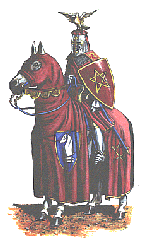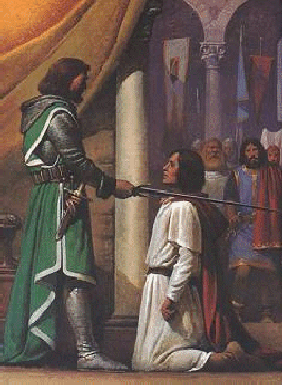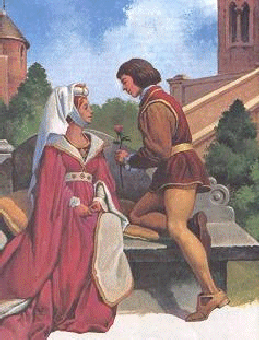Sir Gawain and the |
 Sir Gawain, the nephew of King Arthur, is described by
the unknown author of Gawain and the Green Knight as "the good knight" and
"most courteous" (Norton, 204 & 215). Although young, Gawain understands the
true meaning of chivalry and honor, therefore bases his lifestyle on the knightly Code of
chivalry. This is exemplified through various tests that he faced, both with the Green
Knight, and with the Knight's wife. If all knights were like Gawain, then the Round Table
would be a much better place.
Sir Gawain, the nephew of King Arthur, is described by
the unknown author of Gawain and the Green Knight as "the good knight" and
"most courteous" (Norton, 204 & 215). Although young, Gawain understands the
true meaning of chivalry and honor, therefore bases his lifestyle on the knightly Code of
chivalry. This is exemplified through various tests that he faced, both with the Green
Knight, and with the Knight's wife. If all knights were like Gawain, then the Round Table
would be a much better place.The first character test he is put to occurs when he faces the supernatural forces of the Green Knight during the New Year's celebration at Camelot. As the Round Table is faced with an extraordinary challenge, to swing at the stranger with an ax, Gawain bravely steps in for King Arthur when no one else is willing. He is fearful that Arthur will endure some great danger by partaking in the stranger's game, therefore he would rather subject himself to the danger and protect Arthur. He is able to save his lord from any possibility of jeopardy and his fellow knights of humiliation by jumping up from the dinner table and screaming:
This shows the respect that Gawain has for his king. He is a great knight, but he modestly
says that "the loss of my life would be
Gawain's ethics are thoroughly tested when he had to face the eroticism of Bercilak's wife
when visiting the castle in the woods. He is presented with many opportunities to have an
affair with the woman who was basically throwing herself at Gawain, by lustfully saying,
"My body is here at hand, your each wish to fulfill; your servant to command I am,
and shall be still." (Norton, p. 228) Although his policy is to try to please
everyone as much as possible, especially the women, he chooses to stay focused in his
actions and what he was there for. He is too concerned with the upcoming battle with the
Green Knight to even acknowledge the wife's advancements. Even if he hadn't been extremely
worried about facing the Green Knight, all the morals that have been Sir Gawain is a hero in not only this poem but in all the other stories about him. In the Wedding of Sir Gawain and Dame Ragnell, Gawain acts in a most courteous, chivalric manner. He is unquestionable when King Arthur approaches him with the dilemma of trying to find what it is that all women most desire. Gawain is not one to complain or whine that it is a stupid request. Rather, he immediately offers himself by saying:
Gawain has no problems setting aside nearly a year of his life to helping Arthur with his quest for the knowledge of what women want. That is a very good example of honor and respect. But, the finest showing of Gawain's love for his lord comes when Arthur asks Gawain to marry the hag, Dame Ragnell. Gawain's response is exquisite:
Gawain is saying that it doesn't matter how foul and ugly this woman is, as long as Arthur needs him to do this, he will keep his word due to his love for his lord. The last priceless example of Gawain's chivalry is demonstrated when she offers him the choice of being beautiful by day and foul by night, or vice-versa. Some men would have their opinions armed are ready to voice in this manner. Gawain chooses to handle this situation alternatively. By abiding to the lesson that he and Arthur learned earlier, Gawain can only reply:
By giving the choice to the foul hag, he is
yielding to her and therefore demonstrating his chivalry. Truth, honor and respect are
what Gawain is all about, and in every one of his actions. In this case, his actions have
earned the beauty from his wife during both the night and day. Home | Passage Analysis | Character Analysis |
 least of any." He knows that he is a great knight and
is extremely important to the unity of the Round Table, but he would rather stay humble
and retained than to call himself superior. Gawain then finds himself in a whole new world
of trouble when the Green Knight picked up his own decapitated head and continued his
conversation as if nothing had happened. Never the less, Gawain followed through with his
promise to meet with the stranger, despite his fears. The rest of the court pleads for him
to stay, but Gawain bravely replies, "Why should I tarry? In destinies sad or merry,
true men can but try." (Norton, p.214) Although bravery is not noted as Gawain's best
characteristic, he is truly the bravest of them.
least of any." He knows that he is a great knight and
is extremely important to the unity of the Round Table, but he would rather stay humble
and retained than to call himself superior. Gawain then finds himself in a whole new world
of trouble when the Green Knight picked up his own decapitated head and continued his
conversation as if nothing had happened. Never the less, Gawain followed through with his
promise to meet with the stranger, despite his fears. The rest of the court pleads for him
to stay, but Gawain bravely replies, "Why should I tarry? In destinies sad or merry,
true men can but try." (Norton, p.214) Although bravery is not noted as Gawain's best
characteristic, he is truly the bravest of them. instilled in him
would have prevented him from committing the adulterous act. He does allow her to kiss
him, but that is only because she is the woman in charge, and he is trying to respect her
and her wishes. Both of these challenges of ethics Sir Gawain passes with flying
colors and each time throughout his life he faces a difficult situation he gains more
respect and honor than he had before. The tasks that he accomplishes prove once more the
true attitude of the chivalrous knight.
instilled in him
would have prevented him from committing the adulterous act. He does allow her to kiss
him, but that is only because she is the woman in charge, and he is trying to respect her
and her wishes. Both of these challenges of ethics Sir Gawain passes with flying
colors and each time throughout his life he faces a difficult situation he gains more
respect and honor than he had before. The tasks that he accomplishes prove once more the
true attitude of the chivalrous knight.